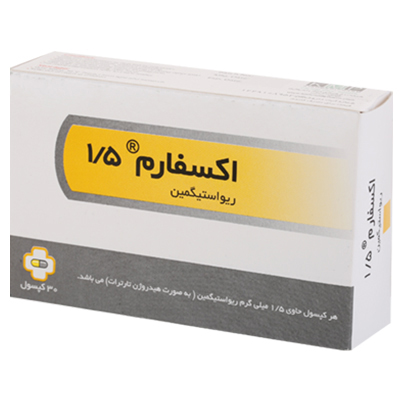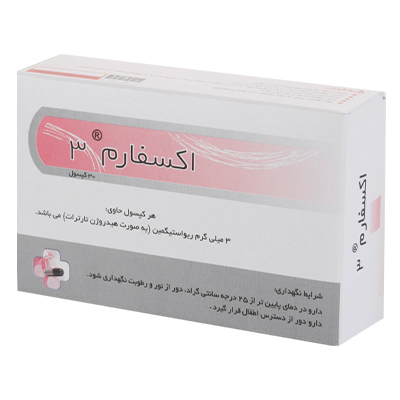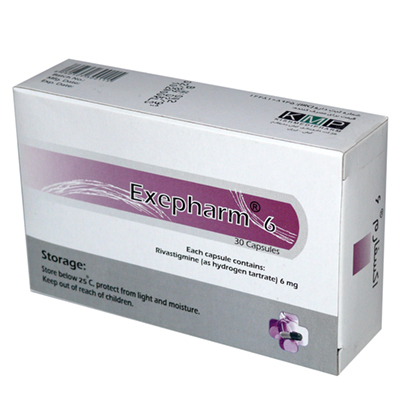Description
Expharm tablets
One of the biggest problems that society is struggling with today is dementia and Alzheimer's. In addition to taking away a person's self-confidence, this problem may also cause irreparable harm. After monitoring and monitoring the person's condition and health by the attending physician and ensuring this condition, the specialist usually introduces some exercises, proper nutrition, a good lifestyle, and medications. Although there is currently no definitive solution to treat Alzheimer's, one of the best drugs to control the symptoms of dementia is rivastigmine. This drug combination increases the level of this vital neurotransmitter in the brain by inhibiting the enzyme acetylcholinesterase, thereby helping to improve cognitive functions.
Expharm tablets are formulated in doses of 1.5 mg, 3 mg, 4.5 mg, and 6 mg by Kish Medipharm Pharmaceutical Company with the active ingredient rivastigmine. Rivastigmine is produced worldwide in oral tablet, oral liquid solution, transdermal or skin patch, and oral capsule formats.
In terms of therapeutic class and drug class, Expharm is considered an antidementia, cholinergic, and parasympathomimetic drug and is excreted through urine.
As mentioned, this pharmaceutical product is formulated in tablet form at Kish Medipharm Pharmaceutical Company, but many people mistakenly think that Xpharm capsules are manufactured by Kish Medipharm.
Uses of Expharm
Oxapharm tablets are formulated with different doses, which are prescribed only by a specialist doctor, depending on the severity of the disease. It is recommended to take Oxapharm in the morning on an empty stomach with a full glass of water, and this medicine usually has an effect for up to 10 hours, of course, the duration of Oxapharm's effect depends entirely on the severity of the disease, the type of disease, and the dose of the drug. Below, we have mentioned some of the uses of Oxapharm tablets:
- Treatment of dementia and Parkinson's dementia
- Improving and treating mild to moderate Alzheimer's disease
- Control and improve mild to moderate Parkinson's disease (improve memory and concentration)
- Improvement of vascular dementia (dementia caused by vascular problems)
Contraindications for using Expharm
Although drugs are produced to treat and control diseases, many of them must be taken under the supervision of a specialist physician because they can have unwanted side effects if not followed as directed or taken arbitrarily. The treating doctor recommends drug therapy in many cases by examining and monitoring the individual's health and physical conditions, age, gender, medications taken, genetics, severity, and type of disease.
It is necessary to declare all your conditions completely when visiting the doctor so that you can be of great help in solving the problem and dilemma that has arisen. As announced, Expharm is prescribed to control and treat some diseases such as Alzheimer's and Parkinson's, but like all other drugs, it may not be suitable for all people. We will now mention the conditions in which a person cannot use Expharm or rivastigmine:
- Hypersensitivity or allergy to rivastigmine or any of the ingredients in Expharm
- People under 18 years of age
- People with a history of cardiovascular disease, severe lung problems including pulmonary obstruction, urinary tract and bladder disorders, epilepsy and seizures, kidney disease, and skin problems including psoriasis and eczema.
- Pregnancy and breastfeeding
Drug interactions of Expharm
Expharm or rivastigmine can interfere with many medications, especially those that affect brain function. It is essential to provide a complete list of your diet and medications when you visit your doctor. Drug interactions usually interfere with the absorption, metabolism, and effects of medications, resulting in reduced effectiveness, increased risk of side effects, and adverse effects. Below are the most common drug interactions with Expharm:
- Anticholinergic drugs such as benztropine, diphenhydramine, and trihexyphenidyl
- Antidepressants, including sertraline, paroxetine, and duloxetine
- Nonsteroidal anti-inflammatory drugs, such as ibuprofen and naproxen
- Other cholinesterase inhibitors (galantamine)
- Alcoholic beverages and their derivatives
- Grapefruit and its juice
- Anesthetic drugs
Side effects of Expharm
Medicines are produced to treat, control, and prevent diseases, but they may cause other problems at the beginning of use or throughout the course of treatment. Some of these occurrences can be controlled, but others require further examination by a doctor, a visit to the emergency room, or replacement of medications. Remember, if the symptoms and complications worsen after taking any medication, you must follow it up as soon as possible. The side effects of Expharm (rivastigmine) are summarized below:
- Increased blood pressure
- Head, pain, and head گیجه
- Urinary incontinence
- Isolation, delusions, and depression
- Boredom, fatigue, and weakness
- Trouble sleeping and insomnia
- Nausea, abdominal pain, and vomiting
- Increased sweating, followed by dehydration
- Weight loss, severe lethargy, and loss of appetite
Tips about Exaform
Keeping the medicine in the box with the brochure inside is one of the most important tips that is always recommended. The instructions of the attending physician, pharmacist and following the items mentioned in the product brochure can be of great help to the quality of treatment. We have tried to answer your most common questions and state very important points about Expharm tablets:
- At the beginning of use, be sure to inform someone close to you that you are taking this medication, as side effects, including fainting, may occur.
- Expharm should be stored in a cool, dry place, below 30°C, away from sunlight. Avoid freezing the medicine.
- This medicine should never be available to children.
- Using rivastigmine can cause concentration problems and drowsiness. When taking it, avoid activities that require concentration, such as driving, studying, and operating heavy machinery.
- Do not crush, chew, or break Expharm tablets under any circumstances. This medicinal product must be swallowed whole.
- You can take Expharm with water and non-acidic drinks. Drinking soda, tea, coffee, and grapefruit juice with rivastigmine is not recommended at all. This medicine is usually used twice a day as recommended by a doctor and can be taken with food to prevent nausea and digestive problems.
Conclusion
Expharm, which is produced from the raw material rivastigmine in doses of 1.5 mg, 3 mg, 4.5 mg, and 6 mg by Kish Medipharm Pharmaceutical Company, is available at pharmacies across the country at a low price. This pharmaceutical product is prescribed only by a specialist physician to control and treat symptoms of diseases such as Parkinson's and Alzheimer's and should not be used arbitrarily.
Remember that the explanations provided are intended to further introduce the drug Expharm or Rivastigmine, and given the special importance of this drug, it should only be prepared and consumed under the supervision of a physician. Therefore, all of the information provided will not replace the instructions of your doctor.




Reviews
There are no reviews yet.